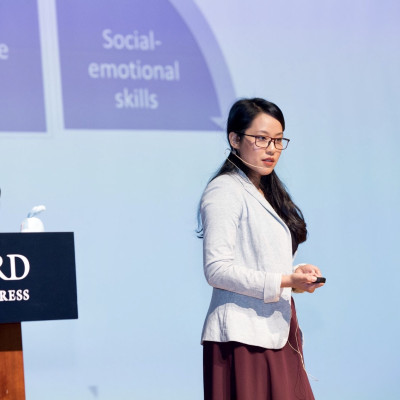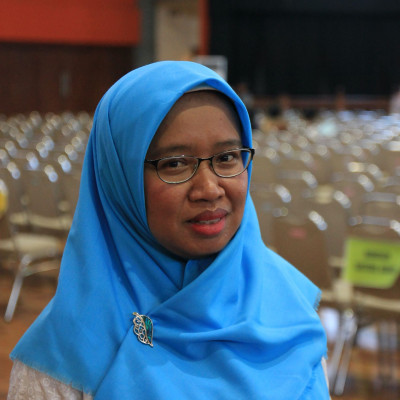Sessions / Location Name: Graded Readers
Physical Location
Location: 701
ER 101: Starting Strong with Extensive Reading #4058
What is Extensive Reading, and how can we help students get started? What should they read, and how do we build and look after a library that will help them improve? How can we check if students are reading and making progress, without taking away the freedom that ER gives? This practical workshop gives an introduction to ER for teachers new to the approach. It also offers ideas for experienced practitioners who are looking for effective ways to introduce ER to their students, colleagues, or institutions. We will look at a range of rationales for ER including fluency development, vocabulary growth and affective benefits, and discuss how these can be communicated in different teaching contexts. The attendees will also share ideas about text selection, library development, assessment strategies, and the role of the teacher in an ER environment.
Writing Graded Readers #4035
This workshop will be a hands-on look at how graded readers are written and how ideas become books. Writing compelling graded readers requires more than just simplifying language—it involves thoughtful design, creative storytelling, and a deep understanding of learner needs. This interactive workshop will guide participants through the entire process of writing graded readers, from concept development to final draft. We will explore how to choose topics that engage learners, balance linguistic control with natural language, and build progression across levels. Participants will examine techniques for adapting existing texts and crafting original stories, incorporating CEFR-aligned vocabulary and grammar. Special attention will be given to voice, pacing and chapter structure among other elements. The session will also cover tools for planning, drafting, and editing. Whether you're new to writing or looking to refine your approach, this workshop offers practical strategies and inspiration to help you create effective, enjoyable graded readers.
How to Train Young Brilliant Minds to be Culturally Aware Using Graded Readers #4055
Research has shown that children who are exposed to Extensive Reading from a young age not only excel in academic skills, but also develop empathy, moral judgement and become culturally sensitive. Equipping students to explore diverse perspectives has never been more crucial in this day and age. Bennett (1986) proposes six stages of acculturation that learners can move through to gain greater cultural awareness. With constant exposure, they develop their own personal ideas, ultimately assimilating the culture of others into their own worldview. In this presentation, we will explore theories of “Cultural Development” and the cultural trajectories in the students’ learning journey to assimilation using themes from Eli’s Real Lives Series Graded Readers as a stepping stone. At the end of the session, participants will have a better understanding of how to utilise Graded Readers for all CEFR levels.
A Post-Graded Reader Wasteland? Issues, Tools, and Solutions for Japanese #4085
L2 English learners have been blessed with a wealth of research and resources to address various issues in reading comprehension and fluency development, but the same level of attention has not been paid to the issue of “laddering up” to independent reading in other languages. For Japanese, there is the additional barrier of kanji on top of the potential barriers to reading texts written for L1 speakers such as vocabulary, grammar and cultural knowledge. This presentation will discuss these issues as well as introducing some of the available tools and potential solutions that can assist learners to reach independent reading, such as the use of Aozora Bunko and the JLEX lexical analyser. In particular, it will focus on fostering learner reading outside of the classroom, given that the large volumes of text required to achieve independent reading are best done outside of class hours, with some in-class support.
From Concept to Classroom: Writing Graded Readers #4112
In this session the presenters will discuss the process of writing graded readers from an initial idea, to writing and editing, and to finally getting the books into the hands of students in both paper and digital formats. Where do stories come from? How do we ‘find’ stories and tell them in an engaging and interesting way? We will detail the steps that have worked for us — from ‘story,’ format, length, level, editing and illustrations, to publishing steps and options, including ISBN numbers — all while trying to keep abreast of the rapid advancement of online tools. Mistakes have been made and lessons have been learned. We share where we are today in this journey in the desire to support burgeoning writers.
Graded Picture Books: The Perfect Fit for Young Foreign Language Learners #4113
This presentation explores the growing trend of graded reading materials globally, focusing on graded picture books as ideal for young foreign language learners. It examines the limitations of traditional readers, highlights successful series like Kids Town from Korea, Climbing English from China and addresses challenges such as the lack of standards and the need for comprehensive databases.
Graded Readers: Challenges, Opportunities and Creative Rewards #4095
This panel discussion brings together experienced graded reader authors to explore the unique challenges of creating engaging and impactful fiction and non fiction while working within strict linguistic constraints. The session will also examine what the key priorities for writers are, what opportunities and challenges the genre offers, and how teachers themselves can delve into the art of crafting stories of their very own for their students.
ERF Graded Reader Writing Consortium: A discussion #4461
The Graded Reader Author Network in Thailand (GRANT) group and the Graded Readers Authors in Indonesia (GRAIN) groups have formed to write graded readers with local sensibilities. The reason for these initiative is that graded readers from the major publishers are often Western-centric and few SE Asia names appear in these book and even fewer deal with issues young SE Asians face. Very few if any local legends, fables and fairy tales are available in a well-structured syllabus. The aim of both groups is to train authors to write graded readers with SE Asian and local sensibilities. Some training has already taken place in Thailand and will take place in Malang, Indonesia on October 6-7th.
This is a session for the ERF to discuss and co-ordinate with the GRANT and GRAIN groups and to discuss a range of issues they will face when co-operating in the coming years.
From Classroom to Bookshelf: Writing and Self-Publishing Graded Readers #4144
This session is aimed at educators and aspiring authors interested in writing or self-publishing graded readers. Drawing on my experience writing over 25 published titles, it will reflect on my journey from teacher to author and independent publisher. It will begin with an overview of my experience running an extensive reading program at a Japanese university and how the challenges faced by my students inspired me to begin writing graded readers. The session will follow the path from original reader ideas to my first publications with an established publisher and later launching my own line of independently published readers. It will also cover my process for creating readers and the specific challenges of producing engaging content for lower-proficiency young adult learners. Practical insights and ideas will also be shared on areas such as tools for text grading and editing, cover and audio production, obtaining ISBNs, and publishing both print and digital editions across various platforms.
The First Year of an ER School in China: Design, Implementation and Progress #4065
This presentation aims to share insights from the establishment and operation of an extensive reading school in China, focusing on curriculum design and student engagement strategies. Through a series of regular and short courses, tailored reading plans, and ongoing feedback mechanisms, the program addressed diverse learner needs—from young beginners to exam-focused older students. Findings revealed that structured yet flexible ER plans, coupled with consistent feedback for students and parents, significantly improved reading engagement and reading ability across age groups. Younger learners developed language foundations through guided reading, and older students balanced ER with exam prep through strategically curated texts. The program’s progress highlights the importance of adaptable curricula, personalized tracking, and interactive incentives in sustaining motivation. Practical takeaways will equip educators to implement ER effectively in varied contexts, emphasizing scalability and learner-centered design.
Using Graded Classic Readers in the EFL Class: Why and How? #4447
Graded readers are widely recognized as an enjoyable and effective tool for EFL learners to develop key language skills such as reading fluency, vocabulary acquisition, and overall confidence. These readers come in various forms—fiction, nonfiction, and adapted classic literature. In this presentation, I will focus on classic readers, which serve as accessible gateways to timeless stories and literary styles. Classic readers not only help learners engage with literature in a manageable way but also offer insights into diverse cultures, historical contexts, and worldviews, enriching the language learning experience. Together, we will explore practical classroom activities and share ideas on how to foster positive associations with reading through the use of classic graded readers.
The ERF Graded Reader List: Past, Present & Future #4150
The ERF Graded Reader List is an online database featuring English graded readers from over 30 major publishers. Data for each book include publisher, series, word count, headwords, level (publisher, CEFR), genre, format, awards, etc. The main database consists of a separate Google Sheets file for each publisher. A companion, all-in-one list includes a limited set of data for all books in one searchable Google Sheets file, viewable on mobile devices. This presentation will provide an overview of the history and features of the List, as well as thoughts on continuing development. Discussion will focus on how the list might be improved, particularly on ways in which current technology could enhance its usefulness and functionality for educators and learners.
'The kind of girl who eats pizza': Gender Representation in Graded Readers #4156
Research into the pedagogical benefits of Extensive Reading has bloomed in the last decade, yet socio-cultural content of ER materials has not received similar attention. While there is a significant body of literature related to gender in ELT textbooks, research into gender representation in English-language graded readers is nearly non-existent. The presenters worked to address this gap through a collaborative, two-pronged study of English graded readers. A set of narrative fiction readers and another of non-fiction readers, including titles from several publishers, were selected while considering relevance in the researchers' teaching context. The researchers examined and coded the visual and textual content in the selected readers for gendered representations and used content analysis to build a description of each set, then compared and contrasted the respective data. This session will present the findings in detail, explore the implications for instructors and ER programs, and note further avenues for related research.
Breaking the Rules for Better Extensive Reading Implementation #4110
Most Extensive Reading Practitioners are familiar with the ten “principles” of extensive reading listed in Day & Bamford (2002) and elsewhere. This paper, however, will suggest that we can have our students read more by ignoring some of the principles.
The only principle that cannot be violated is their #4, “Learners read as much as possible” since this is the very definition of Extensive Reading, but breaking some of the other nine may allow the students more practice. For example, one rule states that “The reading material is easy,” yet a vocabulary list provided along the text would allow students to understand more difficult material. This will expand what is available for them to read but adds more work for the teacher. In the above manner, we will discuss the various “characteristics” and suggest reasons for not following them in order to provide more reading material for your students.
Speedy Readers: A new graded readers series for teenagers #4448
How can we get reluctant readers to pick up a book and read? It is simple, give them something interesting to read! Speedy Readers is a brand-new series published by Oxford University Press specifically designed for teenagers. They are short, leveled to CEFER and cover a range of current topics from popular video games and movies to influencers and life hacks. They are also 100% digital with audio and short videos to enhance the reading experience. Come and join this session to experience Speedy Readers for yourself.
Deepening Extensive Reading with the MINDSETS Framework #4136
Experts claim that extensive reading (ER) is an essential practice in language education. But students often consume texts passively, so how can we help learners engage more actively with stories and texts to deepen comprehension and retention? In this workshop, we’ll apply the MINDSETS Framework, an evidence-based approach that guides learners through eight generative learning strategies: Mapping, Imagining, Narrating (self-explaining), Drawing, Summarizing, Enacting, Teaching, and Self-testing. These strategies move learners beyond passive reading, fostering deeper comprehension, effortful retrieval practice, and long-term retention. Participants will experience hands-on activities using MINDSETS techniques to enrich ER practice, mapping key ideas, summarizing creatively, enacting scenes, peer teaching, and self-testing. Through structured exercises and discussion, attendees will leave with a clear actionable framework and practical, adaptable strategies to enhance ER instruction across various proficiency levels. Whether teaching younger learners or adults, this approach makes ER more interactive, reflective, impactful, and fun.
From Reading to Mastery: A Step-by-Step Approach to Expanding Writing and Vocabulary through Extensive Reading #4117
How can Extensive Reading (ER) be systematically leveraged to enhance writing and vocabulary skills at different proficiency levels? Based on six years of hands-on experience teaching students in a Korean academy, this session presents a step-by-step framework for integrating ER into writing and development across different learning stages. - Beginner: Building Foundations Guided Reading Responses – Using structured sentence starters to encourage early writing engagement. - Intermediate: Strengthening Skills Genre-Based Writing Tasks – Encouraging shadow writing from their reading and summaries, opinion pieces, and creative adaptations. - Advanced: Mastery and Expression Critical Analysis & Argumentative Writing – Developing independent thinking by engaging in comparative essays and theme-based writing. By following this structured approach, educators can effectively transform reading into a powerful tool for writing fluency and vocabulary expansion. Case study of students whose skills improved ensures that students not only absorb language but also actively produce and refine their linguistic abilities.
Reading Around Graded Readers #4138
Despite the variety of graded-reader (GR) titles in the major European languages, in their search for a “genuine” reading experience many curious learners and teachers peek beyond these GR at authentic literature. Although “authentic” books might seem incomprehensible for Japanese low-to-intermediate-level learners of German, this search is worthwhile because there are few truly low-level GR available. A previous book analysis of the Gruffalo and the positive feedback from students concerning the enjoyability of such a challenging book further fuel prospects of authentic texts. Considering the Japanese setting this study analyses Manga and children's books for their suitability as extensive reading materials. Keeping an eye on the balance between supporting factors such as pictures, familiarity and shorter idea-units on the one hand, and the challenging grammar and vocabulary on the other, we will present book analyses trying to map out strategies to identify appropriate reading material.
Four Practical Tools to Add to the ER Teacher's Toolkit: A Workshop #4244
While appropriate difficulty and compelling content are essential for extensive reading, “linked skills activities” (Nation, 2024) that incorporate students` reading can further enhance learner engagement in coursework. This workshop aims to introduce four tools to use with ER and provide teachers with actual practice and takeaway materials. Reading Circles (Furr, 2009) include unique roles for students to address in discussions on common reading texts. Six Hats Thinking is a structured discussion format where participants first adopt a shared perspective before exploring others and can be used for selecting books. Mini-Bibliobattle is a 3-minute oral book report competition where attendees share their different favorite books and Q&A sessions decide a champion title. ER with Audio Support explains how reading-while-listening is key for development in young learners where novice readers decode words with phonics using audio/visual cues to aid comprehension. The sessions will share guidelines for instruction and feedback, and student reactions.
Graded Readers: What is available publisher by publisher #4121
Until relatively recently few publishers, mostly the larger ones, published graded readers. However, in recent years there has been an explosion in the number of books available. Big companies, small companies and individual writer/publishers are producing some excellent books in graded format. These books cover a wide range of genres, such as adventure, romance, mystery, and non-fiction, to appeal to all types of reader. They are available at different levels, in different formats and wordcount. So, how do we know which books we can use in tandem with other classroom content? How do we recommend books to students? How can we create themed assignments? In this session, the presenters will give a brief, informative overview of the different series available by publisher giving participants a clearer idea of what is available in this market.




























